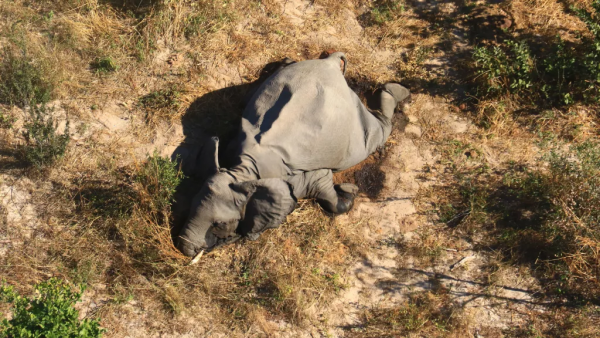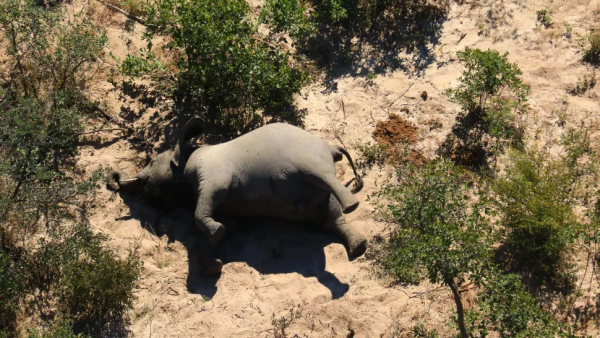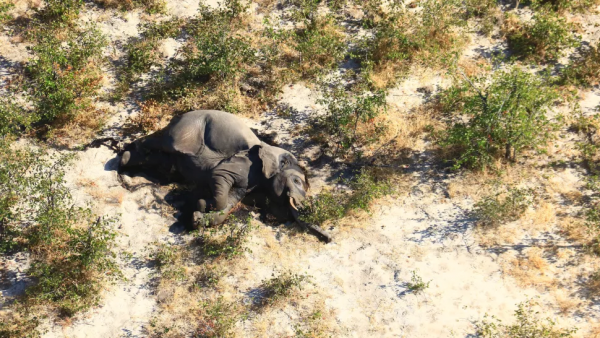Over 350 Elephants Mysteriously Drop Dead
Elephants are one of nature’s most glorious animals — massive, smart, social, and adorned with splendid trunks they use for everything from drinking water to showing affection to their young to fighting.
But in spite of their intimidating size, elephants are at risk in many countries, mostly because poachers butcher them and take their tusks, which are valuable in everything from the jewelry trade to traditional Chinese folk medicine.
In some places they are so at risk they are considered endangered, and fines and prison sentences await anyone who has the audacity to break local laws and poach them for the ivory of their tusks.

Botswana has one of the Africa’s largest elephant populations, with estimates at about 130,000 in total, according to wildlife experts. Now, however, that number has been reduced because of a mysterious series of deaths — hundreds of elephants, more than 350, have died in the Okavango Delta.
There is no known cause of the deaths yet — not drought, not poaching, experts say, as the tusks of the dead animals were untouched. They simply died where they stood, falling forward and perishing right on the spot in the delta.
Poachers are not to blame, but nonetheless, conservationists worry that the illegal ivory trade will try to harvest them somehow, and have urged officials in Botswana to guard the carcasses closely until further tests have been conducted to discover the cause of death.
Authorities have ruled out anthrax, a disease mammals can contract, but they have yet to get lab results that show whether there has been a large scale poisoning or disease.
Experts, authorities and conservationists alike are apparently mystified, as the elephants seem to simply keel over and die, with no apparent sign of injury or harm.
The mass deaths began at the beginning of May, and by the end of the month, officials were alarmed to find dead elephants all over the delta in northern Botswana. One conservationist referred to the ongoing deaths as, “a conservation disaster.”

The slowness with which samples from the elephant carcasses is getting tested to determine cause of death is causing some consternation in some quarters.
Officials in Botswana say labs are hindered by measures in place to stop the spread of the coronavirus, but others believe this should take priority in order to understand the calamity. “I don’t know of a die off that has been this significant,” said Niall McCann, director of conservation at the U.K.’s National Park Rescue.
He continued that all haste must be accorded the samples so scientists can understand what is happening, and perhaps prevent further deaths in other populations.

In a press release issued by the African Wildlife Foundation, which works closely with a variety of countries to stop poaching and preserve species at risk, officials said that samples from the elephants have been shipped to labs in Canada, Zimbabwe and South Africa to try to determine whether an unknown pathogen is at work.
To that end, any of the animals who collapsed near human populations in villages and other communities are now being destroyed, to safeguard against the transfer of germs and bacteria.
Naturally, now that scientists know the coronavirus came from an animal — probably a bat — experts are taking extra precautions to ensure such a thing does not happen again.
Another Article From Us: 2300-Year-Old Scythian Woman’s Boot Preserved in the Frozen Ground
In the meantime, wildlife lovers and conservationists alike continue to mourn the loss of such a large number of elephants. For many, this is the creature that symbolizes everything countries in Africa have done right in terms of conservation. Now, something not yet understood, something unseen, is threatening their very presence in one of the nations they roam.





